
Many foreigners in China have their first serious encounter with baijiu, China's potent white spirit, when they join in Spring Festival celebrations. But while some foreigners shun the clear grain distillate (and mutter about "kerosene"), many are finding wine-like subtleties in the top-shelf varieties and a new appreciation for the liquor.
Chinese-American Simon Deng is one of the co-founders of Capital Spirits, a bar in a Beijing hutong (lane) that he believes is the world's first dedicated to baijiu and craft liquor. We asked him for insights and advice that would make everyone an expert when Chinese New Year arrives.
Q: First things first: What is baijiu?
It's a clear alcohol distilled from different grains, usually sorghum, after aging in earthen pits with yeast. It's generally 40 to 60 percent alcohol by volume.
Q: Your bar serves more than 40 different kinds. Where do we start?
There are four basic types: rice, light, strong and sauce. While "rice" is literally made from rice, the other labels tell you more about the aroma, not the strength of the alcohol.
Among the four types of baijiu, I personally enjoy the "strong aroma" type the most. Beginners will normally favor the rice-flavored baijiu first, due to its clean flavor, and then slowly develop a taste for the "strong" or "sauce" aroma baijiu. "Light" is not for the light-hearted with its typical high alcohol and strong flavor - don't let the name category fool you.
Q: Should novices jump in with both feet and say "Ganbei!", or can you dip a toe in and learn to appreciate baijiu?
We serve flights of four samples, in small tasting shots, to give people an introduction to the four types. Once they decide their type, we can offer four more samples of their favorite type.
Some visitors come to the bar with a baijiu-drinking friend, but don't intend to drink shots of baijiu themselves. We convert about 90 percent of them once they try it. We serve tasting shots in very small glasses, so people can sample a few without getting loaded.
For people curious about baijiu, we also like to suggest trying it in a cocktail, such as a baijiu sour.
Q: What's the most popular?
"Strong" is probably the most popular and widely distilled category of baijiu. It's particularly common in China's southwestern Sichuan province, eastern Anhui, Jiangsu and Shandong. Famous "strong" brands include Wuliangye and Luzhou Laojiao; such brands are mostly based on the grain sorghum. The "strong" types have floral, licorice flavor with a strong, pungent aftertaste.
Q: How long does it take to make?
Premium strong-aroma baijiu can be aged from one to three years, but the action is really much longer. The strong-aroma distilleries specialize in continuous distillation, which allows the microoganisms to develop their unique tastes over many decades or sometimes a few centuries. Luzhou Laojiao's 1573, for example, is named after the last time the fermentation tanks were cleaned! Using the last batch of mash for the next mash ensures continuity in taste. Different layers of the distillate are then aged in batches for at least six months before bottling.
Q: What do we do when we are at a Lunar New Year celebration and the host brings out the baijiu and a bunch of glasses?
My advice would be, of course, to drink what you are offered to give face to your host. Then offer to buy the next round and choose the baijiu type you like (rice, strong, light, sauce). If you don't know the difference, go with the rice-based baijiu since it's the easiest to drink. The host will most likely be impressed by your knowledge of baijiu!
Q: Is it true that we won't get a hangover?
Normally if you have a meal, and the baijiu is of good quality, you won't get a hangover.
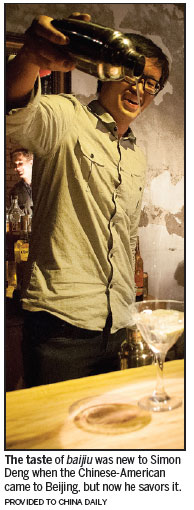
(China Daily 02/10/2015 page24)
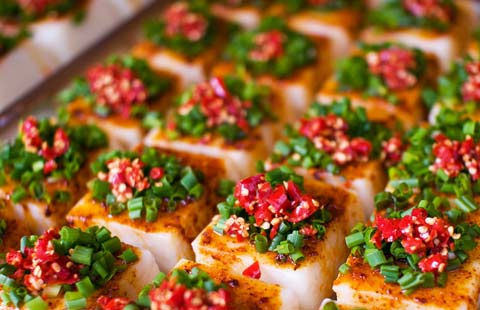
China's top 10 foodie cities |
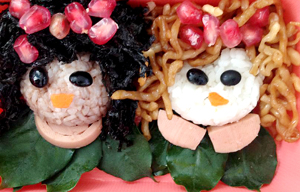
Cute boxed meals |
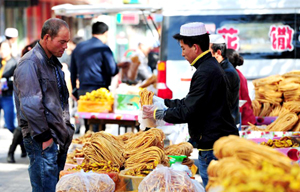
Muslims greet annual festival of Eid al-Adha in Yinchuan |
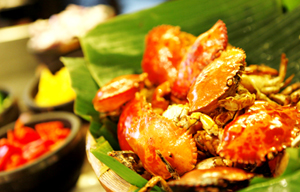
Cafe Noir hosts Singapore food festival |
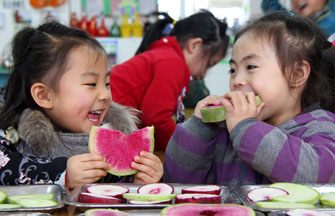
Biting the spring |
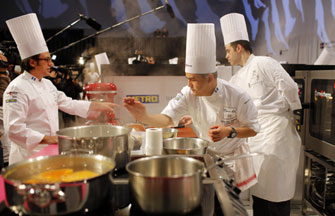
Bocuse d'Or Final gastronomic competition in France |
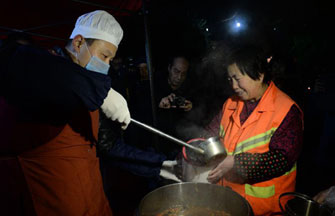
Temples in Xi'an distribute free Laba porridge |
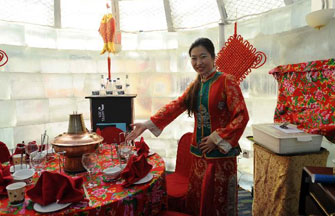
Ice house restaurant opens to public in Shenyang |